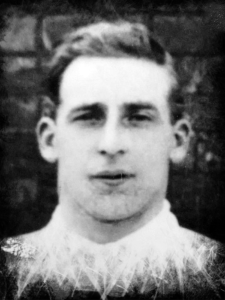 William Luke MM (1890-1992) was born in the Northumbrian village of Acklington on 17 December 1890 and died there in January 1992. A winger by trade, Luke played nine league and cup games for Preston North End before the First World War, during which he won the Military Medal before sustaining serious wounds serving on the Western Front. When Luke died at 102 in 1992, he was the oldest surviving former-professional footballer in the country.
William Luke MM (1890-1992) was born in the Northumbrian village of Acklington on 17 December 1890 and died there in January 1992. A winger by trade, Luke played nine league and cup games for Preston North End before the First World War, during which he won the Military Medal before sustaining serious wounds serving on the Western Front. When Luke died at 102 in 1992, he was the oldest surviving former-professional footballer in the country.
Football Career
Luke began his career at local amateur side Trimden Grange before moving to Bedlington United in 1911. After impressing at the North Eastern League club, Luke signed for Preston North End and made his debut in a 1-1 home draw with Stockport County on 2 September 1912. He would go on to score twice in eight games during the 1912/13 season, helping Preston win promotion as Second Division Champions. The winger would find further playing time difficult to come by at Deepdale, however, and in the summer of 1913 he left Lancashire to sign for Hartlepool United.
After spending two seasons at Victoria Park, Luke would leave the club to enlist in the British Army. After subsequently sustaining serious wounds in France, Luke was forced to retire from the game. Despite his injuries, Luke would go on to become the oldest surviving former professional footballer in the country. He eventually died in January 1992, aged 102-years-old.
First World War Service
Driver 610365 Luke enlisted in the Royal Field Artillery (RFA) on 28 October 1915 and was subsequently posted to No. 4 Depot RFA in Woolwich for training. On 17 November, he was sent to 3A Reserve Brigade at Larkhill before moving back to Woolwich in June 1916, this time to join 4A Reserve Brigade. Soon after, he qualified as a class 2 signaller.
On 2 July 1916, Luke arrived in France with A Battery of the 223rd Brigade RFA, a newly-formed unit that had been created from the 2/1 Leicestershire Battery of the Royal Horse Artillery. Consisting of 18-pounder field guns, A Battery and 223rd Brigade would subsequently serve with the 63rd (Royal Naval) Division for the duration of the war. During the final phase of the Battle of the Somme, Luke’s battery would be part of the artillery support for 63rd Division’s assault on the village of Beaucourt. After heavy fighting in atrocious conditions, the village was finally capture on 14 November 1916. Four days later, the Somme offensive was brought to an end.
After spending the winter of 1916 on the Somme, Luke’s battery moved to lines east of Arras in April 1917, where British and Commonwealth forces had launched an offensive against the fortified defences of the Hindenburg Line. On 9 April 1917, Luke was seriously wounded in his right leg and evacuated to the rear. Soon after he was recommended for the Military Medal. Having returned to hospital in Britain, the award of his MM was confirmed in the London Gazette on 18 July 1917. However, it was clear that the war was over for Luke, and on 1 August 1918 he was discharged from the army as “No longer physically fit for War Service.”
CAREER STATISTICAL RECORD
| Season | Club | League Pos | FA Cup | League Games | League Goals | FA Cup Games | FA Cup Goals | ||||||
| 1910/11 | Trimdon Grange | ||||||||||||
| 1911/12 | Bedlington United | ||||||||||||
| 1912/13 | Preston North End | 1st (Second Division) | R1 | 8 | 2 | 1 | |||||||
| 1914/15 | Hartlepool United | ||||||||||||
| Summary | |||||||||||||
| Preston North End | 8 | 2 | 1 | ||||||||||
| Totals | 8 | 2 | 1 | ||||||||||
A full list of sources used to create this page can be found here.

